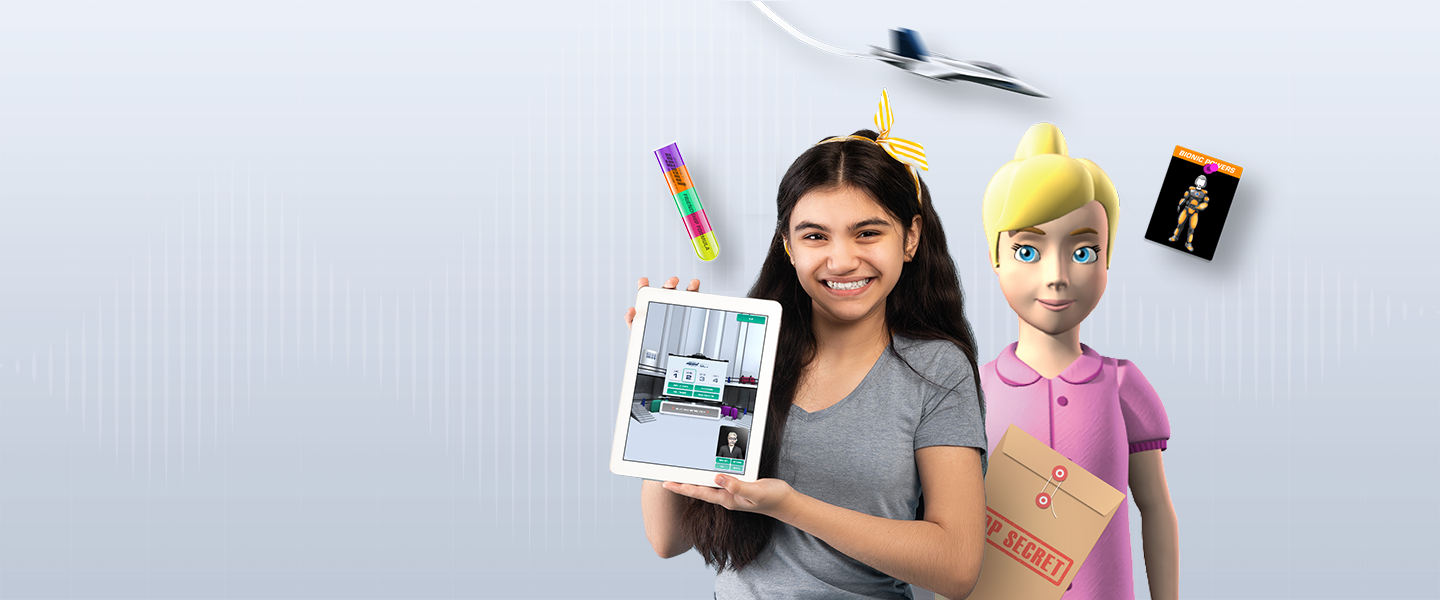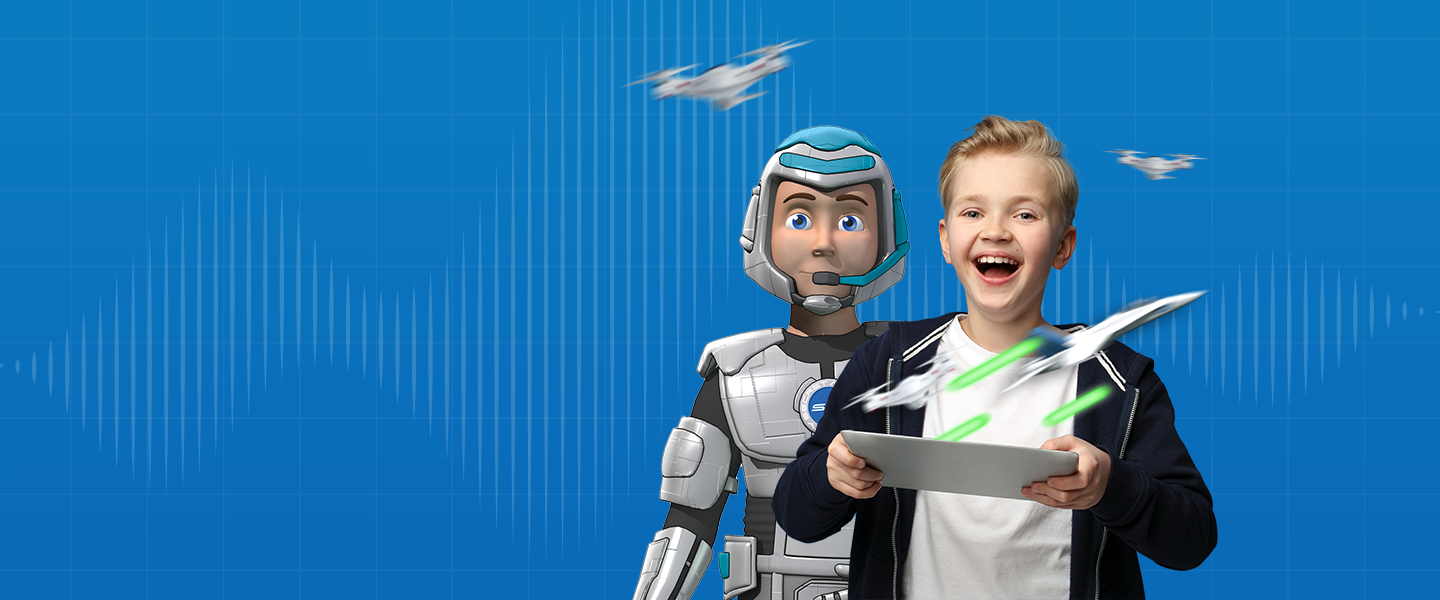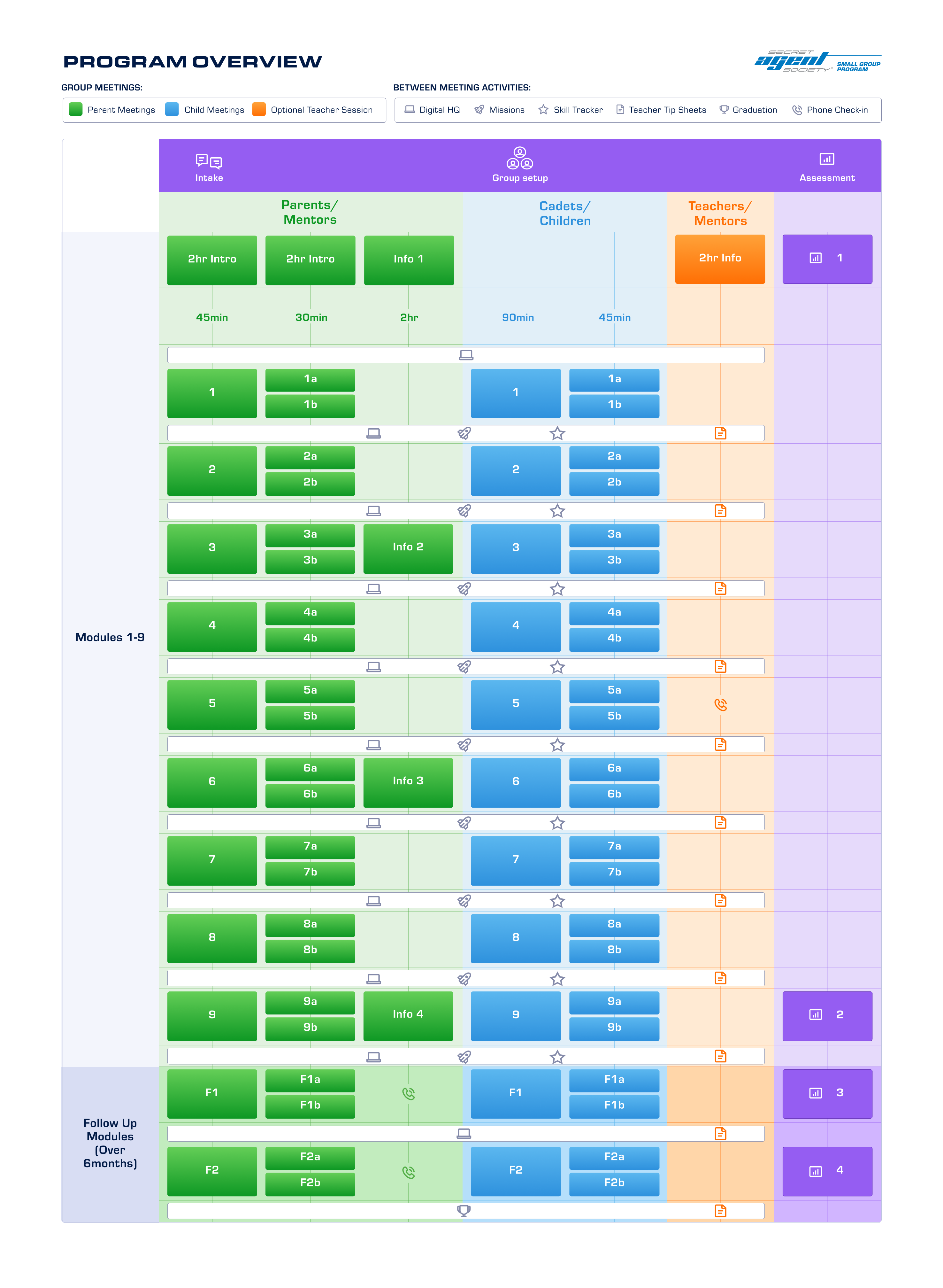Comprehensive & Effective
The Secret Agent Society Small Group Program

The award-winning and evidence-based SAS Small Group Program has been meaningfully improving the lives of children around the world for more than a decade.
The espionage-themed program engages 8–12-year-olds in social and emotional development through gamified learning, skill generalisation, reward systems, and interactive clinician-led sessions.
Beginning as ‘Cadets’, children join regular Club Meetings guided by professionally-trained SAS Facilitators. A sophisticated and specially-designed online platform connects Cadets, their adult support network and their SAS Facilitator in a digitally-enabled wraparound approach.
At the end of the program, children graduate as ‘Secret Agents’ having learnt and practised codes and tools that focus on four key life skills:
Emotion Recognition
in self and others
Emotion Regulation
particularly anxiety and anger
Social Problem Solving
alone and in a group
Social Skills
for friendship and teamwork!
Benefits of SAS Small Group:
Evidence-based and effective
With more than 20 publications including 4 Randomised Control Trials completed over the past 14 years, the SAS Small Group Program has a substantial evidence base underpinning its engaging and fun approach.
Integrated and holistic
The SAS Small Group Program is an integrated, holistic approach to diversifying life skills not just in an individual child, but also their adult support network. Parents and Mentors (including teachers) learn the same espionage-themed codes and tools to empower whole-of-community development.
Revolutionising group delivery
Assessment, group planning and delivery is streamlined and easy, with integrated scheduling and assessment tools, pre-populated program content and fully-digitised interactive resources all at the SAS Facilitator's fingertips through the SAS online platform.
Accessible no matter where you live
SAS Providers are based all over the world. If a family is unable to access an SAS Provider nearby, all that is needed is a compatible device and internet connection to connect to the SAS digital health platform for joining group meetings, accessing content and completing assessments - all possible via telehealth or remote schooling.
SAS Small Group Trailer
Check out the 60 second SAS Small Group trailer for your sneak peek into the Secret Agent Society!
Evidence-based
Components of the SAS Small Group Program

SAS Small Group is a multi-component program that upskills and empowers not only children with social and emotional goals, but also the parents and teachers who support them. The program includes:
Cadet Club Meetings are held as either 11x90min or 22x45min sessions, inclusive of 2-4 booster sessions. The first 9 (if 90min) or 18 (if 45min) sessions are typically delivered weekly with the remaining booster sessions spread out over a six-month period.
Prior to starting with Cadets, the first Parent Group Meeting involves a 2-hour parent information session. This is followed by either 11x45min, 22x30min, or 4x2-hour group meetings over the course of the program.
Parent Group Meetings are an important component of the program's success, providing an opportunity to advise and support parents on the content being learnt in Cadet Club Meetings and how to practice these skills in real life.
Parent meetings are typically held after each Cadet Club Meeting and without children present, however the scheduling and setup of meetings is entirely flexible and can be tailored by the SAS Facilitator.
Teachers are updated on the skills and content Cadets are learning each week, and provided guidance on how they can support the application of skills in the classroom and playground.
This occurs through providing a series of SAS Teacher Tip Sheets, access to the child's Skill Tracker, teacher consultation, school visits, and an optional school staff presentation.
The SAS Small Group Program is mapped to the Australian National Curriculum and is often written into children's individual learning plans to assist teachers to meet the social-emotional goals of their students.
Between each Cadet Club Meeting, children participate in weekly tasks and 'missions', including playing online gamified learning, skills practice activities in day-to-day life and completion of a reflection journal.
This short-term daily motivation tool is used to encourage Cadets to practice their SAS skills at home and school, aligned with their progression through the program.
A combination of questionnaire booklets, an observational assessment tool, computer game performance and Skill Tracker progress provides valuable information to guide areas of focus for each individual child as well as providing easy, comprehensive and multi-source outcome reporting.
Automated assessment is available for SAS Facilitators to streamline intake and reporting processes.
Espionage-themed gadgets and Skill Codes are incrementally introduced throughout the program in line with the evidence-based program structure.
Gadgets and Skill Codes can be personalised by each Cadet and are saved to their digitised Gadget Pack during Cadet Club Meetings.
They are designed to help Cadets practice and use their SAS skills in everyday life through providing visual reminders and quick-reference guides to use in real-time at home, school and in the community.
The Cadet's Gadget Pack can be quickly and easily accessed by the Cadet or their Mentors through a compatible device such as a smart phone at the shops, a tablet at school, or on a desktop computer in the library.

Introducing the specially-designed SAS online platform
A sophisticated, interactive and integrated online platform that is revolutionising group program delivery.

One-Stop-SAS-Shop
Three gateways manage secure access to program content and data: the Facilitator Dashboard, Mentor Portal, and SAS Digital HQ (for Cadets).

Facilitator Training
Once eligibility criteria has been met and an application submitted, trainees access and complete the 14-hour self-paced SAS Facilitator Training Course through the SAS online platform.

Just-in-time Resources
Facilitators access their training content, SAS Facilitator Manual, and lesson plans when needed, whether in real-time during a Club Meeting or for preparation.

Group Management
Facilitators create groups, allocate Mentors, facilitate Cadet Club and Parent Group meetings, plus view progress and more all within the Facilitator Dashboard.

Interactive Sessions
Interactive program content allows Cadets to talk, type, draw and play their way through meetings while the Facilitator integrates peer interaction and individual participation with full visibility of Cadet Club Journal activity.

Easy Cadet Access
Cadets access all their Club Meetings and between-session tools such as their Gadget Pack, Skill Tracker, Mission Journal and Club Journal via SAS Digital Headquarters.

Mentor Connection
Through the Mentor Portal, parents and teachers can quickly and easily access Parent Group Meeting content, Teacher Tip Sheets, Assessment Questionnaires, and Cadet content such as their Gadget Pack.

Progress Reports
Overall group and individual progress can be reviewed at a glance. Skill Tracker activity, Teacher Tip Sheet access, meeting attendance, Mission completion, and SAS Computer Game play is all monitored and easy to develop into reports.